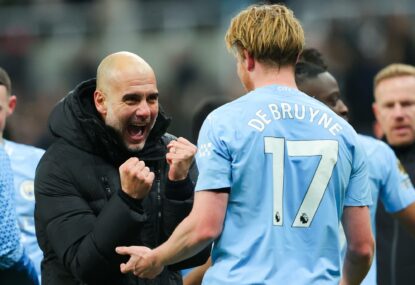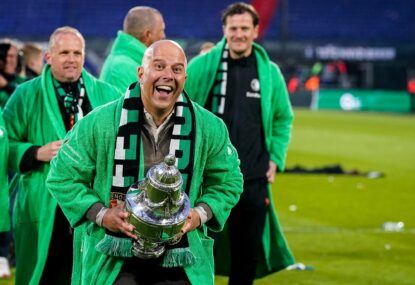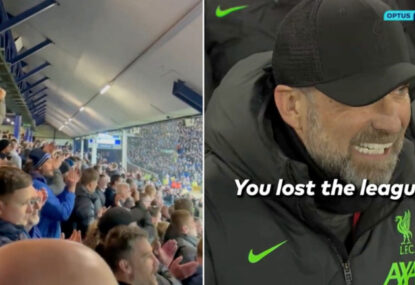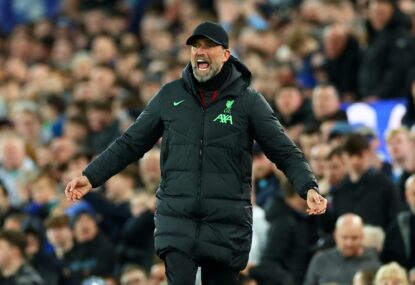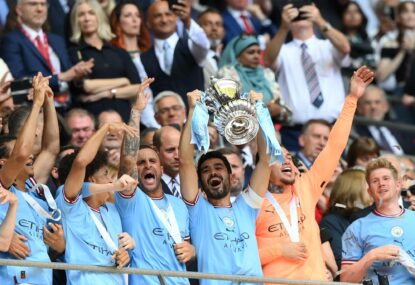The in-club ban Sunderland imposed on Adam Johnson, following his arrest in March on suspicion of engaging in sexual activity with a girl under the age of 16, was lifted in time for the winger to face West Ham United on Saturday.
Sunderland lost that match, to a late Diafra Sakho goal, and Johnson, who came on as a substitute, was booed and jeered by the West Ham home fans after every touch.
The club’s decision, assumably on the request of new manager Dick Advocaat, to bring Johnson back into the fold has raised eyebrows. The statement they released announcing the flip-flop read as sheepish, uncomfortable and crimson-faced.
“The club has discussed the current position in detail with both the PFA (Professional Footballers’ Association) and Adam’s representatives,” it said.
“In line with those discussions we recognise that the player is entitled to recommence his duties with the club while the legal process continues. He will therefore return to training.”
It’s difficult to discern exactly how genuine the ‘contractually obliged’ angle put forward by the statement is. Johnson being legally entitled to “recommence his duties”, regardless of the trepidation of his employers, is one thing, but it also seems clear that Advocaat is intending to use Johnson as a key figure in his push to avoid relegation.
The club might not legally be allowed to stand him down completely, but they don’t have to play him. Yet, in the 73rd minute, Johnson trotted on against West Ham.
Johnson is, of course, innocent until proven guilty. The crime for which he was arrested, and for which he is currently on bail, is horrendous. And football has already shown itself as self-consciously twitchy around the issue of sexual assault, regardless of legal entitlements.
Ched Evans, convicted of rape in 2012 and incarcerated until October last year, has been at the centre of the most high profile controversy of this kind. Evans, who, in the eyes of the law, has served his time for the crime he committed, has been unable to secure a contract as a footballer since his release, with no club seemingly prepared to suffer the massive public relations blow that would come with signing him.
Oldham, who were a hair’s breadth away from signing Evans in January, called off the deal at the last minute after coming under what the club described as “unbearable pressure”, both financial and public.
In theory, Evans is completely entitled to seek re-employment as a footballer, just like Johnson is entitled to train with Sunderland as police investigate the incident within which he is embroiled. But clubs are demonstrably enforcing their own lifetime ban on Evans, the reasons for which, outside of any PR ramifications, are crystal clear; Evans’ case was an abhorrent affair, the legal conclusion of which didn’t stop the suffering of his victim, who was harangued and demonised mercilessly by the friends and supporters of Evans long after he had been convicted.
Her trauma continues to this day. Evans has only recently apologised for this, although he still maintains his own innocence.
So, is it just the drop in public opinion, or the loss of key sponsors that’s stopping clubs from getting involved with this issue? Anyone halfway morally optimistic about the world would be hoping that this isn’t the only roadblock, that moral and ethical objections to hiring convicted or accused rapists are more important than losing shirt sponsors. But, as is often said and written bitterly, football can be a moral-free zone, particularly when talented players are involved. And the issue of rehabilitation must also be considered.
Other sports’ policies when dealing with players accused, but not yet convicted or acquitted, of crimes has been a conspicuous issue of late. In the NFL, Baltimore Ravens running back Ray Rice was legally cleared of criminal assault after he punched his wife into unconsciousness in an Atlantic City casino elevator.
Initially given a meagre two-game ban by the NFL, Rice was later sacked by the Ravens after graphic footage emerged of the incident. Rice then filed a formal grievance for wrongful termination, which was settled.
In January, Indianapolis line backer Josh McNary was charged with rape, and was immediately placed on the NFL commissioner’s exempt list (after which he was put in a professional situation that most closely resembles a sort of paid leave), pending the outcome of his trial.
Closer to home, the Gold Coast Titans have recently welcomed back five players who are facing drugs charges. Greg Bird, Dave Taylor, Beau Falloon, Kalifa Faifai Loa and Jamie Dowling all returned to training after being reinstated by the club’s board.
Their return has been celebrated by the coaching and playing staff, although obviously drugs charges are very different to charges relating to sexual or physical assault. But it too raises the concern; is simply being accused of a crime enough to warrant instant, even indefinite, suspension?
Sunderland fans chanted Adam Johnson’s name two days after he was arrested. West Ham repeatedly made clear to their fans in the lead-up to Saturday’s match that offensive or inappropriate chanting wouldn’t be tolerated, not that it made much difference.
The question of blanket rules in these situations won’t go away, and if Johnson is convicted, will he too endure the same exile as Evans? Would it be entirely deserving if he did? And what of the view, idealistically naive or not, that those who have broken the law, and have paid for it, should then be welcomed back into society?
Awkward collar-pulling abounds when attempting to negotiate these questions. Football isn’t alone in not having smoothly navigated this issue. But with the problem of how to deal with grave crimes in football becoming an increasingly visible blight, the calls for concerted action to clarify the moral and legal grey areas just get louder and louder.





























































































